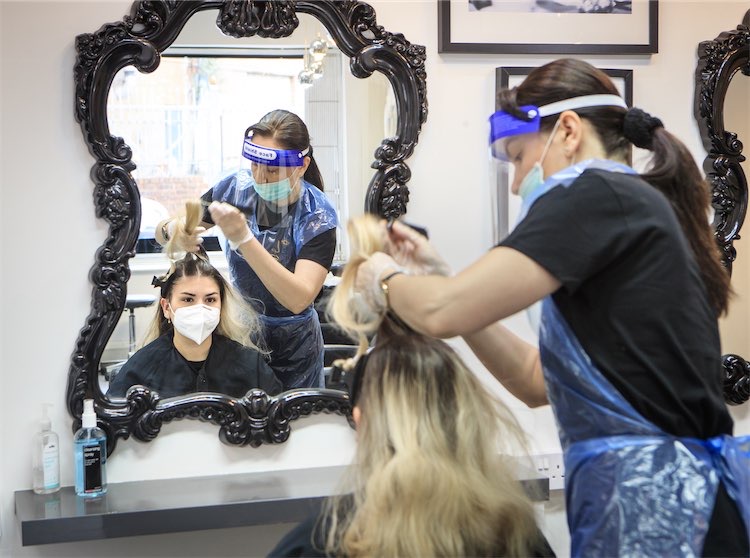All The Key Dates In Boris Johnson’s Roadmap To End Lockdown From Pubs Re-Opening To International Travel
5 min read
The prime minister has laid out his plan to bring England out of lockdown, beginning with schools on March 8 and a potential end to all legal restrictions on 21 June.
Here are the earliest target dates by which lockdown restrictions can be eased according the government’s four-phase timeline.
The changes are subject to vaccination targets being met, as well as infection rates continuing to decline and there is no risk of the NHS becoming overwhelmed.
Phase 1 (part 1) – 8 March
Pupils of all ages can go back to school, including college students. Wraparound childcare, including before and after school clubs, will also be able to return.
Under-18 sport can also take place at school as part of educational provision, or as part of wraparound care, but not recreationally.
Every care home resident in England will be able to nominate a single named visitor who can come in for a regular visit.
The visitor will have to take a rapid lateral flow test every time they visit, wear PPE and keep physical contact to a minimum.
Funerals will be allowed with up to 30 attendees, and weddings can take place with up to 6 people.
Students on higher education courses at English universities who need practical teaching, complete assessments or access specialist facilities to finish their studies can also return.
But for other students on non-practical courses, their return to campus will be subject to a review which will report back by the end of the Easter holidays.
The "Stay at Home" restriction will continue but it will be amended so that people can leave home for recreation as well as exercise outdoors - with their own household, support or childcare bubble, or with one person from another household.
Phase 1 (part 2) – 29 March
The “Stay at Home” message will end, with a focus instead on staying local where possible.
Socialising outdoors can take place between two households of any size, or up to six people from more than two households, and will apply in all outdoor settings, including private gardens.
Parent and child groups of up to 15 will now be allowed to take place outdoors.
Outdoor sport and leisure facilities such as golf courses, lidos, tennis and basketball courts could be able to re-open.
Organised outdoor sport will also be allowed for children and adults and will not be subject to the gatherings limits, but should be compliant with guidance issued by national governing bodies.
Phase 2 – 12 April
Indoor leisure including gyms will be able to reopen but exercise must be done within single households.
Outdoor attractions like zoos and theme parks open along with indoor venues like libraries and immunity centres should be allowed to unlock.
All retail will reopen as well as personal care like hairdressers and beauty salons, and activities such as driving tests may also resume.
Outdoor hospitality can open so beer gardens and restaurants with outdoor space can start serving, with no requirement for a substantial meal to be served alongside alcoholic drinks,.
There will also be no curfew, but venues will need to offer table service.
Holidays in the UK can begin, with self-contained accommodation reopen and overnight stays within households allowed.
The numbers allowed at wedding, wakes and receptions is increased to 15.
But people should continue to work from home where they can, and minimise domestic travel where possible.
Phase 3 – May 17
Most legal restrictions on meeting others outdoors will be able to end, but gatherings of more than 30 people outdoors will remain illegal.
Indoors, people will be able to meet socially in a group of 6, or with 1 other household, though it may be possible to go further than this depending on the data at the time.
Indoor hospitality can re-open, but people must order, eat and drink while seated, and remaining outdoor entertainment, such as outdoor theatres and cinemas can open.
Indoor entertainment, such as museums, cinemas and children’s play areas can open, as will remaining accommodation, such as hotels, hostels and B&B.
Indoor group sports and exercise classes can restart.
Some large events, including conferences, theatre and concert performances and sports events can begin – with up to 1,000 people or 50% of a venue’s capacity, whichever is lower, permitted indoors.
With outdoor events allowed in venues at a capacity of either 50% or 4,000 people, whichever is lower.
The Government will also make a special provision for large, outdoor, seated venues where crowds can be safely distributed, allowing up to 10,000 people or 25% of total seated capacity, whichever is lower.
At this stage, weddings, receptions, funerals, and commemorative events including wakes can proceed with up to 30 attendees and a broader range of life events including bar mitzvahs and christenings will also be permitted.
This is also the earliest date that international travel will be permitted, subject to a review by the department for transport's Global Travel Taskforce, which will report on 12 April.
Phase 4 – June 21
With appropriate mitigations in place the government aims to remove all legal limits on social contact at this point.
They hope to reopen the remaining closed settings, including nightclubs and enable large events, including theatre performances without the phase three capacity restrictions.
But this will be subject to the outcome of the scientific Events Research Programme and potentially using testing to reduce the risk of infection.
Finally the government hopes to remove all limits on weddings and other life events, also subject to a review.
